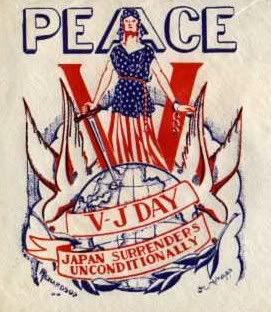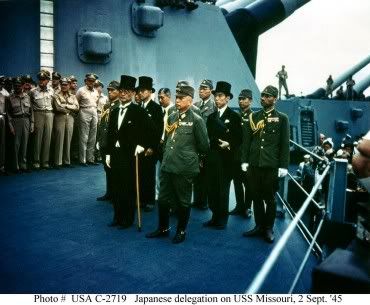MrBern
I'll Lock Up
- Messages
- 4,469
Nagasaki marks 61st anniversary of A-bomb
Wed Aug 9, 1:25 AM ET
TOKYO (Reuters) - The mayor of Nagasaki criticized Iran and North Korea for their nuclear programs and had harsh words for the United States for failing to halt nuclear proliferation as the Japanese city marked the 61st anniversary of its atomic bombing.

Elderly survivors, children and dignitaries bowed their heads at the city's Peace Park near "ground zero" for a moment of silence at 11:02 a.m. -- the moment when a U.S. bomber dropped the world's second atomic bomb on August 9, 1945.
Earlier, others attended masses at Urakami Cathedral in the city, home to many of Japan's tiny number of Christians.
The anniversaries of the bombing of Nagasaki and Hiroshima three days earlier coincide this year with renewed concerns about nuclear programs by Iran and by North Korea, which last month jolted the region by firing a salvo of missiles.
"Voices of anger and frustration are echoing throughout the city," Nagasaki Mayor Itcho Ito told thousands of people gathered to mourn the more than 140,000 people known to have died.
"The time has come for those nations that rely on the force of nuclear armaments to respectfully heed the voices of peace-loving people, not least the atomic bomb survivors."
Ito also had harsh words for the United States and other nuclear powers for their failure to halt proliferation.
"The nuclear weapon states have not demonstrated sincerity in their efforts at disarmament. The United States of America in particular has issued a tacit approval of nuclear weapons development by India," Ito said.
"At the same time, nuclear weapons declarant North Korea is threatening the peace and security of Japan and the world as a whole.
"In fact, the very structure of nonproliferation is facing a crisis due to nuclear ambitions by various nations including Pakistan which announced its possession of nuclear arms, Israel which is widely considered to possess them, and Iran," Ito said.
In the closing days of World War Two, the United States dropped a 10,000-pound plutonium-239 bomb, nicknamed "Fat Man," on Nagasaki.
It exploded about 500 meters (1,600 feet) above the ground, instantly killing about 27,000 of the city's estimated population of around 200,000. By the end of 1945, the number of dead due to acute radiation exposure reached about 70,000.
The names of 2,831 people who died recently were added to the list of victims, bringing the total number recognized by the city to 140,144. A few thousand names are added each year.
Ito called on Japan to protect its postwar pacifist constitution and keep its pledge never to possess nuclear arms.
"Once again we call upon the Japanese government ... to ground itself in reflection upon history and uphold the peaceful intentions of the constitution," he said.
Prime Minister Junichiro Koizumi ensured the world that Japan would maintain its pacifist constitution and non-nuclear policy.
"Japan, the only country that has suffered atomic bombings in human history, has the responsibility to keep telling the international community about its experience," Koizumi told the crowd.
Koizumi has stretched the limits of the U.S.-drafted constitution, sending non-combat troops to Iraq on the military's riskiest mission since World War Two. The troops have since pulled out.
Japan's ruling party and the main opposition party are also seeking to revise the constitution, whose Article Nine prohibits maintaining a military but has been interpreted as allowing armed forces solely for self-defense.
http://news.yahoo.com/s/nm/20060809/ts_nm/japan_nagasaki_dc
Wed Aug 9, 1:25 AM ET
TOKYO (Reuters) - The mayor of Nagasaki criticized Iran and North Korea for their nuclear programs and had harsh words for the United States for failing to halt nuclear proliferation as the Japanese city marked the 61st anniversary of its atomic bombing.

Elderly survivors, children and dignitaries bowed their heads at the city's Peace Park near "ground zero" for a moment of silence at 11:02 a.m. -- the moment when a U.S. bomber dropped the world's second atomic bomb on August 9, 1945.
Earlier, others attended masses at Urakami Cathedral in the city, home to many of Japan's tiny number of Christians.
The anniversaries of the bombing of Nagasaki and Hiroshima three days earlier coincide this year with renewed concerns about nuclear programs by Iran and by North Korea, which last month jolted the region by firing a salvo of missiles.
"Voices of anger and frustration are echoing throughout the city," Nagasaki Mayor Itcho Ito told thousands of people gathered to mourn the more than 140,000 people known to have died.
"The time has come for those nations that rely on the force of nuclear armaments to respectfully heed the voices of peace-loving people, not least the atomic bomb survivors."
Ito also had harsh words for the United States and other nuclear powers for their failure to halt proliferation.
"The nuclear weapon states have not demonstrated sincerity in their efforts at disarmament. The United States of America in particular has issued a tacit approval of nuclear weapons development by India," Ito said.
"At the same time, nuclear weapons declarant North Korea is threatening the peace and security of Japan and the world as a whole.
"In fact, the very structure of nonproliferation is facing a crisis due to nuclear ambitions by various nations including Pakistan which announced its possession of nuclear arms, Israel which is widely considered to possess them, and Iran," Ito said.
In the closing days of World War Two, the United States dropped a 10,000-pound plutonium-239 bomb, nicknamed "Fat Man," on Nagasaki.
It exploded about 500 meters (1,600 feet) above the ground, instantly killing about 27,000 of the city's estimated population of around 200,000. By the end of 1945, the number of dead due to acute radiation exposure reached about 70,000.
The names of 2,831 people who died recently were added to the list of victims, bringing the total number recognized by the city to 140,144. A few thousand names are added each year.
Ito called on Japan to protect its postwar pacifist constitution and keep its pledge never to possess nuclear arms.
"Once again we call upon the Japanese government ... to ground itself in reflection upon history and uphold the peaceful intentions of the constitution," he said.
Prime Minister Junichiro Koizumi ensured the world that Japan would maintain its pacifist constitution and non-nuclear policy.
"Japan, the only country that has suffered atomic bombings in human history, has the responsibility to keep telling the international community about its experience," Koizumi told the crowd.
Koizumi has stretched the limits of the U.S.-drafted constitution, sending non-combat troops to Iraq on the military's riskiest mission since World War Two. The troops have since pulled out.
Japan's ruling party and the main opposition party are also seeking to revise the constitution, whose Article Nine prohibits maintaining a military but has been interpreted as allowing armed forces solely for self-defense.
http://news.yahoo.com/s/nm/20060809/ts_nm/japan_nagasaki_dc




